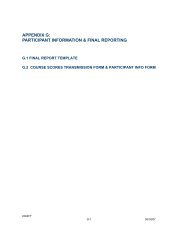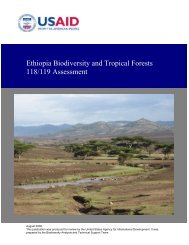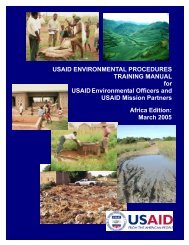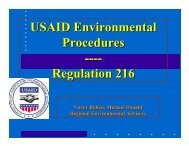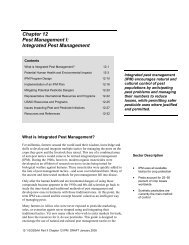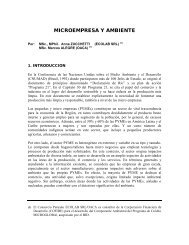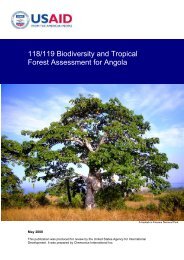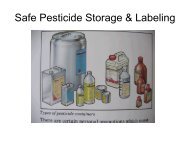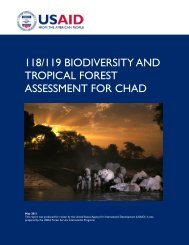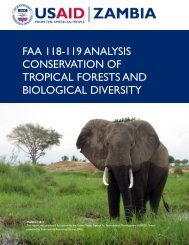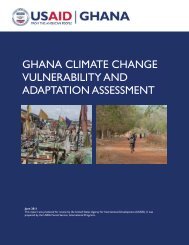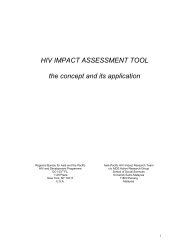usaid/nambia environmental threats and opportunities assessment
usaid/nambia environmental threats and opportunities assessment
usaid/nambia environmental threats and opportunities assessment
Create successful ePaper yourself
Turn your PDF publications into a flip-book with our unique Google optimized e-Paper software.
o<br />
Low-input fish ranching can be promoted <strong>and</strong> supported using carefully selected local<br />
indigenous fish species.<br />
<br />
Strengthen community-based tourism by:<br />
o<br />
o<br />
o<br />
o<br />
o<br />
Lobbying for improved access by conservancies (communal or freehold) to gain concessions <strong>and</strong><br />
other rights in State-owned parks, so that conservancy tourism products are more viable.<br />
Where appropriate, fences between these compatible forms of l<strong>and</strong> use need to be removed or<br />
breached so that connectivity is improved <strong>and</strong> open l<strong>and</strong>scapes are achieved – this will be good<br />
for tourism, biodiversity, <strong>and</strong> coping with climate variability <strong>and</strong> increasing aridification.<br />
Build management capacity (especially in cases where a private sector partner is absent or<br />
unlikely to emerge – e.g. a community campsite).<br />
Facilitate agreements (where necessary) between conservancies <strong>and</strong> investors.<br />
Assist conservancies to identify <strong>and</strong> develop tourism products. Promote the adoption of<br />
Namibia’s Eco-Award criteria, which address issues such as the maintenance of “sense of place,”<br />
aesthetic design, water <strong>and</strong> energy efficiency, benefit sharing, <strong>and</strong> on <strong>and</strong> off-site impacts.<br />
RECOMMENDATION: IMPROVE TENURE<br />
As mentioned in previous ETOAs, achieving appropriate tenure rights for communities over as many<br />
natural resources as possible is one of the highest priorities in terms of enabling people to reduce their<br />
impact on Namibia’s environment. Rights over natural resources, including wildlife, fish, grazing, water,<br />
<strong>and</strong> forests, will provide communities with incentives to make long-term, sustainable investments in the<br />
l<strong>and</strong>.<br />
<br />
<br />
There should also be secure, bankable tenure over commercial <strong>opportunities</strong> such as tourism, so<br />
that there is a reduction in the risks posed by private sector entrepreneurs who wish to invest as<br />
development partners in conservancies. Furthermore, more effective <strong>and</strong> extensive devolution of<br />
rights should be linked to incentives for co-managed l<strong>and</strong>scapes (e.g. group accountability <strong>and</strong><br />
delivery of larger open systems being directly linked to more rights <strong>and</strong> less bureaucracy).<br />
Better management of wildlife for production, especially in lieu of increasing <strong>and</strong> more stringent<br />
droughts – e.g. looking at carrying capacity of wildlife with livestock <strong>and</strong> addressing policy issues<br />
regarding offtake.<br />
RECOMMENDATION: PRACTICE SUSTAINABLE IRRIGATION<br />
Irrigation in a water-stressed country such as Namibia is controversial in terms of l<strong>and</strong> <strong>and</strong> water use but<br />
the Green Scheme initiative is firmly set in the GRN’s sights for the future. Assistance is needed in:<br />
<br />
<br />
<br />
Supporting local community-based small-medium scale irrigation projects (a short distance away<br />
from rivers). This will enhance household food security, diversify livelihoods, <strong>and</strong> reduce<br />
vulnerability to climate variability.<br />
Improving irrigation efficiency for both small <strong>and</strong> large-scale irrigation farming.<br />
Identifying areas in or near conservancies that are likely to be targeted for major irrigation<br />
schemes <strong>and</strong> pro-actively undertake studies (e.g. cost benefit <strong>and</strong> mini-impact <strong>assessment</strong>s) that<br />
will influence future decision making about those intended projects.<br />
USAID/NAMIBIA ENVIRONMENTAL THREATS AND OPPORTUNITIES ASSESSMENT 79





